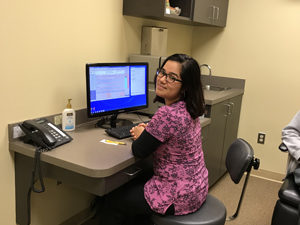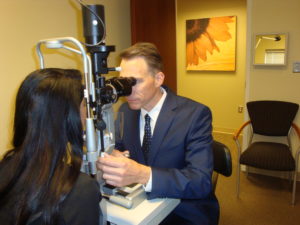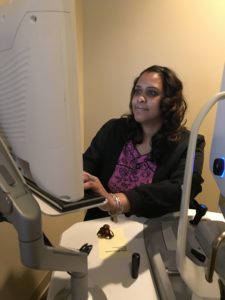 The team at Eye Care & Surgical Center is focused on delivering the highest level of patient satisfaction. They will be with you from your very first phone call to helping you understand your medication, insurance and beyond. Don’t hesitate to pick up the phone and contact us if you have any questions or concerns. You’ll find our staff to be among the most caring people you will meet and they are here to help. We specialize in focused patient care for both adults and children.
The team at Eye Care & Surgical Center is focused on delivering the highest level of patient satisfaction. They will be with you from your very first phone call to helping you understand your medication, insurance and beyond. Don’t hesitate to pick up the phone and contact us if you have any questions or concerns. You’ll find our staff to be among the most caring people you will meet and they are here to help. We specialize in focused patient care for both adults and children.
What can I expect at an eye exam?
 After you have signed in, a technician will escort you to a screening area where he/she will review your general health history and reason for your visit. He/she will check your vision, eye pressure, and will likely put dilating eye drops in your eyes. These usually take about 20 minutes to take effect, at which time the doctor will see you. The doctor will use a slit lamp (a sophisticated microscope) to examine the health of your eyes, from the surface (cornea) to the back (retina). Occasionally, additional measurements may be done at your visit to check more specifically for glaucoma and macular degeneration (such as peripheral vision measurements and optic nerve and retinal imaging), and/or other eye or neurological disease.
After you have signed in, a technician will escort you to a screening area where he/she will review your general health history and reason for your visit. He/she will check your vision, eye pressure, and will likely put dilating eye drops in your eyes. These usually take about 20 minutes to take effect, at which time the doctor will see you. The doctor will use a slit lamp (a sophisticated microscope) to examine the health of your eyes, from the surface (cornea) to the back (retina). Occasionally, additional measurements may be done at your visit to check more specifically for glaucoma and macular degeneration (such as peripheral vision measurements and optic nerve and retinal imaging), and/or other eye or neurological disease.
What is refraction?
 A refraction, which is part of a routine vision exam, is a measurement performed and refined by your ophthalmologist to determine your best-corrected vision. The refraction is necessary to provide a prescription for eyeglasses and/or contact lenses.
A refraction, which is part of a routine vision exam, is a measurement performed and refined by your ophthalmologist to determine your best-corrected vision. The refraction is necessary to provide a prescription for eyeglasses and/or contact lenses.
What is the difference between ophthalmologists, optometrists, and opticians?
An ophthalmologist is a medical doctor with special training to diagnose and treat all diseases of the eye. To become an ophthalmologist requires a minimum of 8 years of medical school and hospital training after college. An ophthalmologist is qualified to provide all aspects of eye care, including cataract and glaucoma surgeries, laser and other eye surgery, as well as to prescribe glasses and contact lenses. Optometrists are doctors of optometry who have completed 4 years of optometry school. They are trained and licensed to provide some aspects of eye care, but they have not attended medical school and have not had medical residency training. In most states, they cannot prescribe all types of medical therapy nor can they perform surgery. Opticians make and dispense (do not prescribe) eyeglasses. They fill prescriptions for eyeglasses and contact lenses, much like pharmacists do for medications.
Do I need my Pressure checked at every visit?
With few exceptions, yes, it is necessary to check the intraocular pressure (eye pressure) at every visit. It is definitely necessary to check vision in each eye at every visit. These are the “vital signs” of the eye.
What is the difference between a “vision exam” and “Medical Exam”?
 A “vision exam” is a basic eye exam, which usually includes dilation of the pupils, and measures a person’s prescription (and need for) glasses. This measurement is called a refraction. Medical testing, such as visual field exams and retinal photography, are not covered by vision insurance plans. A medical eye exam, covered under general medical insurance, is done when the patient has a chief complaint such as eye irritation, pain, diabetes, concern for glaucoma, cataracts, etc. Refractions are, unfortunately, generally not considered a covered service under medical insurance plans.
A “vision exam” is a basic eye exam, which usually includes dilation of the pupils, and measures a person’s prescription (and need for) glasses. This measurement is called a refraction. Medical testing, such as visual field exams and retinal photography, are not covered by vision insurance plans. A medical eye exam, covered under general medical insurance, is done when the patient has a chief complaint such as eye irritation, pain, diabetes, concern for glaucoma, cataracts, etc. Refractions are, unfortunately, generally not considered a covered service under medical insurance plans.
Will I need to have my pupils dilated? If so, Why?
A complete eye examination includes dilation of the pupils to enable the doctor to examine the entire eye, including the back of the eye, which includes the optic nerve, macula, and retina. Rarely, dilating drops are not necessary. Occasionally, the doctor may specify that he/she does not want the technician to put dilating drops in your eyes.